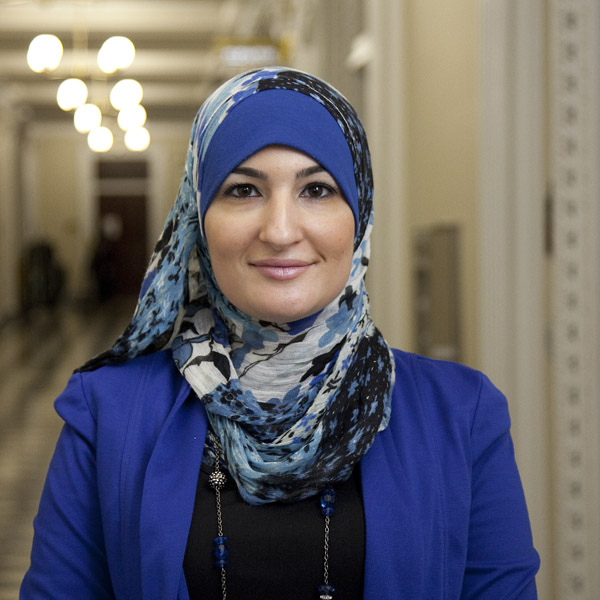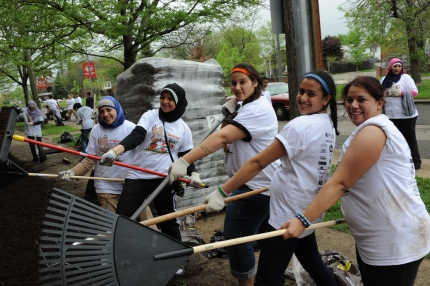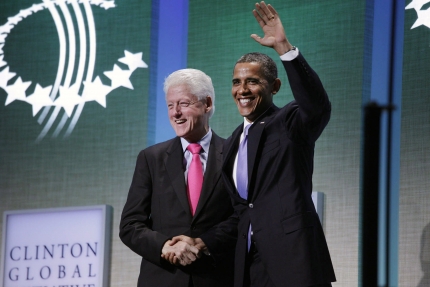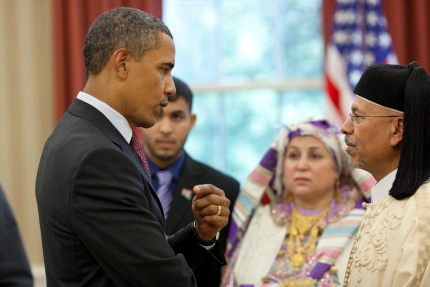Blog Posts Related to the Arab American Community
Spotlight on Commerce: Dee Alexander, Senior Adviser on Native American Affairs
Posted by on March 26, 2012 at 1:49 PM EDTEditor's note: This post originally appeared on The Commerce Blog.
On December 19, 2011 Secretary of Commerce John Bryson appointed Dee Alexander as his Senior Adviser on Native American Affairs. As the Department’s Tribal Consultation Official, Alexander’s principal responsibility is implementing the Department’s Tribal Coordination and Consultation Policy, per President’s Obama’s Executive Order 13175 (PDF), which ensures meaningful and timely input by tribal officials in the development of policies that have tribal implications.
Alexander works closely with the Minority Business Development Agency and other Commerce bureaus to promote the Secretary’s vision for job creation and economic growth on American Indian and Alaska Native communities. As the Senior Adviser on Native American Affairs, Alexander is housed in the Secretary’s Office of Legislative and Intergovernmental Affairs.
Learn more about Additional IssuesCreating A Better Life for All
Posted by on February 28, 2012 at 9:03 PM EDTLast week I had the honor of watching one of the best films I have seen in years. Thanks to the leadership of Secretary Hilda Solis, the Department of Labor (DOL) hosted a screening of A Better Life for students and Administration employees. The film follows Carlos Galindo, a father with the strength and determination to ensure a better life for his son Luis, while living in the shadows of Los Angeles, a place I called home for 9 years.

In front of an audience of nearly 300 stakeholders and guests, Secretary of Labor Hilda L. Solis introduces and holds a discussion with film director Chris Weitz, Diane Cortez, OSHA Investigator; and Lucia Garcia, Wage & Hour Investigator before screening the 'A Better Life' on the evening of Thursday, February 16, 2012. (Photo Credit: Department of Labor)
Learn more about ImmigrationConnecting the Dots
Posted by on December 19, 2011 at 4:45 PM EDT
This week I am being recognized as a Champion of Change for my work empowering Arab and Muslim Americans nationally through civic engagement, direct service and advocacy campaigns. Born in Brooklyn, New York to parents who emigrated here from Palestine and attending NYC public schools my whole life, I would say I was an ordinary kid with an ordinary life.
September 11th, 2001 was the most tragic day our country has ever faced and a day that has changed and reshaped who I am and determined the work I choose to do. In a matter of one day, I went from being an ordinary Brooklynite, New Yorker to one who shares a religion and ethnicity with terrorists. Growing up, my dream was to be a high school English teacher and to work in inner city schools to teach young people how to express their lives, their challenges and aspirations through writing. I hope that I will still venture on this endeavor in the future.
Two months after 9/11, I began volunteering in the Arab American community in Brooklyn which began my career as a local and national organizer. As the Advocacy and Civic Engagement Coordinator for the National Network for Arab American Communities (NNAAC), I am able to connect communities to resources and to each other. The National Network for Arab American Communities is a network of 22 Arab American organizations in 10 states, including the District of Columbia. We work to build the capacity of local community based, grassroots organizations so that they can better serve, empower, represent and engage their constituencies in addressing challenges and issues they are facing in their local communities.
Learn more about ServiceACCESS: A Champion Non-Profit
Posted by on December 9, 2011 at 12:05 PM EDTSince 1971, ACCESS has worked to serve new Americans as they transition to life in the United States as well as our neighbors in need more broadly. From their headquarters in Dearborn, ACCESS works to provide social services to the diverse communities of Michigan. While they are rooted in the Arab-American experience, they perform their work in a culturally sensitive way to empower Michiganders of all backgrounds seeking to steady themselves and their families in these tough economic times. They are truly a Champion Non-Profit that has evolved over the past four decades while both celebrating their rich history as Arabs and affirming their place as a critical part of our American family.
This is how the leaders of ACCESS describe the organization and their work:
ACCESS began with a small group of volunteers who got together 40 years ago to help new immigrants adjust to life in Dearborn, Michigan, pairing one of the most cherished and ingrained characteristics of their Arab heritage – hospitality – with the American tradition of giving back. Through English classes, tax assistance and help with other aspects of a complicated new life in the United States, the volunteers extended their hands to the newcomers – Armenians, Chaldeans, Yemenis, Iraqis, Palestinians and many others who came to the United States seeking a better life.
Today, ACCESS is the largest Arab American human services organization in the United States and offers more than 100 programs housed in eight facilities throughout metropolitan Detroit. Our immigration and translation services and English and civics classes make citizenship accessible for hundreds each year. Children, students and their parents have access to high-quality preschool, after-school tutoring, summer sessions, recreation and sports programs.
President Obama Meets with World Leaders on Day Two at the U.N General Assembly
Posted by on September 21, 2011 at 5:02 PM EDTPresident Obama marked the 19th anniversary of the International Day of Peace with a series of meetings and events as he participated in the 66th session of the United Nations General Assembly in New York City. The President began his day with an address to the General Assembly, where he spoke about the remarkable changes that have occurred throughout the world since the last gathering of this group:
This year has been a time of extraordinary transformation. More nations have stepped forward to maintain international peace and security. And more individuals are claiming their universal right to live in freedom and dignity.
Following the address, President Obama met with Prime Minister Netanyahu of Israel and pledged America’s commitment to the pursuit of peace in the Middle East. The Prime Minister agreed with President Obama's assertion that direct negotiations between Israel and Palestine are the only way to achieve that goal:
I think the Palestinians want to achieve a state through the international community, but they’re not prepared yet to give peace to Israel in return. And my hope is that there will be other leaders in the world, responsible leaders, who will heed your call, Mr. President, and oppose this effort to shortcut peace negotiations -- in fact, to avoid them. Because I think that avoiding these negotiations is bad for Israel, bad for the Palestinians, and bad for peace.
Learn more about , Foreign PolicyPresident Obama to the U.N. General Assembly: "Peace Is Hard, but We Know that It Is Possible"
Posted by on September 21, 2011 at 12:45 PM EDTWatch President Obama address the U.N. General Assembly here.
Today President Obama struck a hopeful note in his address to the United Nations General Assembly on overcoming the numerous challenges that stand in the way of a lasting peace. He advocated for peace defined by more than the absence of war, saying: “a lasting peace -- for nations and for individuals -- depends on a sense of justice and opportunity, of dignity and freedom.”
The President reminded the General Assembly of the progress the United States has made towards a new direction of peace:
The tide of war is receding. When I took office, roughly 180,000 Americans were serving in Iraq and Afghanistan. By the end of this year, that number will be cut in half, and it will continue to decline. This is critical for the sovereignty of Iraq and Afghanistan. It’s also critical to the strength of the United States as we build our nation at home.
Moreover, we are poised to end these wars from a position of strength. Ten years ago, there was an open wound and twisted steel, a broken heart in the center of this city. Today, as a new tower is rising at Ground Zero, it symbolizes New York’s renewal, even as al Qaeda is under more pressure than ever before. Its leadership has been degraded. And Osama bin Laden, a man who murdered thousands of people from dozens of countries, will never endanger the peace of the world again.
So, yes, this has been a difficult decade. But today, we stand at a crossroads of history with the chance to move decisively in the direction of peace. To do so, we must return to the wisdom of those who created this institution. The United Nations’ Founding Charter calls upon us, “to unite our strength to maintain international peace and security.” And Article 1 of this General Assembly’s Universal Declaration of Human Rights reminds us that, “All human beings are born free and equal in dignity and in rights.” Those bedrock beliefs -- in the responsibility of states, and the rights of men and women -- must be our guide.
And in that effort, we have reason to hope. This year has been a time of extraordinary transformation. More nations have stepped forward to maintain international peace and security. And more individuals are claiming their universal right to live in freedom and dignity.Learn more about , Foreign PolicyFirst Ambassador of Free Libya Presents Credentials to President Obama
Posted by on September 9, 2011 at 5:13 PM EDTThis afternoon, I had the privilege to accompany Ambassador Ali Suleiman Aujali to present his credentials to President Obama as the first Ambassador to the United States from a free Libya. The ceremony was a powerful symbol of the transition underway in Libya and the strong support of the United States for the Transitional National Council and the Libyan people.
Just seven months ago, Ambassador Aujali resigned as Ambassador in Washington in protest against the horrible violence perpetrated by the Qadhafi regime against its people. He did so not knowing whether Qadhafi would survive and put down this uprising, just as Qadhafi had managed to repress any dissent throughout his 42-year rule. But today, Ambassador Aujali came to the White House representing a new government that has recently taken over the capital and begun the long process of unifying and rebuilding Libya and undertaking an inclusive, democratic transition.
Today’s ceremony also represents the continued evolution of American support to the Libyan Transitional National Council (TNC). At the July 15th Istanbul Libya Contact Group meeting, Secretary of State Hillary Clinton announced our recognition of the TNC as the legitimate government of Libya at this time. Last month, Ambassador Aujali reopened the Libyan Embassy in Washington under the flag of the new Libya. We hope to reopen our Embassy in Tripoli in the coming weeks. And today, we became one of the first countries around the world to fully credential a Libyan ambassador
srepresenting the new Libya.I look forward to working with Ambassador Aujali and his team in the coming months to continue strengthening the ties between the United States and Libya. I am confident he will be a great advocate for continued partnership, just as he worked tirelessly with our government to help ensure that more than 1500 Libyan students and their families could remain in the United States and continue their studies when the conflict interrupted their funding.
Learn more about , Foreign PolicyPresident Obama on Libya: The future is in the Hands of its People
Posted by on August 22, 2011 at 5:20 PM EDTWatch the President's full remarks here.
This afternoon, following a call with the National Security Council, President Obama spoke about the evolving situation in Libya. Over the past six months, the United States has worked with allies to protect the people of Libya from Muammar Qaddafi's brutality and support them as they seek the opportunity for the citizens of Libya to determine their own destiny. Today, President Obama said, "The Qaddafi regime is coming to an end, and the future of Libya is in the hands of its people," making it clear that the courage of the Libyan people has brought freedom within reach:
Earlier this year, we were inspired by the peaceful protests that broke out across Libya. This basic and joyful longing for human freedom echoed the voices that we had heard all across the region, from Tunis to Cairo. In the face of these protests, the Qaddafi regime responded with brutal crackdowns. Civilians were murdered in the streets. A campaign of violence was launched against the Libyan people. Qaddafi threatened to hunt peaceful protestors down like rats. As his forces advanced across the country, there existed the potential for wholesale massacres of innocent civilians.
In the face of this aggression, the international community took action. The United States helped shape a U.N. Security Council resolution that mandated the protection of Libyan civilians. An unprecedented coalition was formed that included the United States, our NATO partners and Arab nations. And in March, the international community launched a military operation to save lives and stop Qaddafi’s forces in their tracks.
In the early days of this intervention the United States provided the bulk of the firepower, and then our friends and allies stepped forward. The Transitional National Council established itself as a credible representative of the Libyan people. And the United States, together with our European allies and friends across the region, recognized the TNC as the legitimate governing authority in Libya.
Learn more about , Foreign Policy


